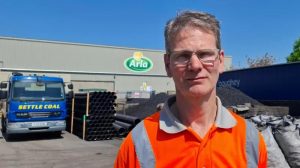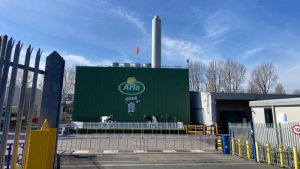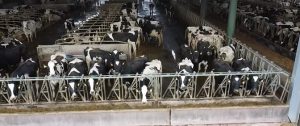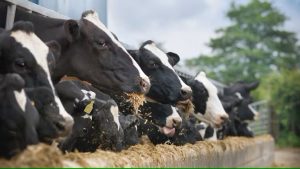
Drinking a mug of tea, Ash Amirahmadi is musing on the similarities between humans and cows. “You wouldn’t think it, but the pregnancy period is the same, nine months; they have the same number of teeth as us; obviously they are mammals as well.”
Amirahmadi could be forgiven for thinking about our bovine friends more than most business leaders, given his role running the UK’s biggest dairy co-operative.
The boss of Arla Foods in the UK – to which a third of Britain’s milk producers belong – appears at home in wellies and a tweed jacket on a farm, even if in recent years he’s more likely to be found in a boardroom, negotiating milk prices with the country’s largest supermarkets.
Amirahmadi is sitting in a barn that looks more like a state-of-the-art conference centre, funded by Arla’s investment in its “innovation farm”, located at a dairy farm run by the Dyson family near Aylesbury in Buckinghamshire.
“We use it as a venue to educate people on the farm agenda, particularly in the context of climate and sustainability,” he says as he sips his tea (strong, with a splash of Arla milk). “This is the place that we can experiment and gather data.”
One project is trialling production of fertiliser made by adding nitrogen from the air to cattle slurry, to try to reduce ammonia and methane emissions. Another uses digital cameras to monitor the Dysons’ cows when they go for milking, looking for any behavioural changes or early signs of illness. “Cows are like us, they don’t like to show if they’ve got a problem. If they are limping they like to hide it,” Amirahmadi says.
This is perhaps not the job Amirahmadi envisioned for himself when deciding to study mechanical engineering at Nottingham University. It’s been quite a journey for the 52-year-old, who arrived in the UK from his native Iran at the age of 10, after his Iranian engineer father and British artist mother left during the Iran-Iraq war.
CV
Age 52
Family Two grown-up children, a daughter and a son.
Education Langley grammar school near Slough; BEng in mechanical engineering at Nottingham University.
Pay Undisclosed. “It would be in the bottom quartile for chief executives of food businesses. You don’t work for a farmer co-op if you want to make loads of money.
Last holiday A recent trip to Nova Scotia in Canada, learning how to paddleboard.
Best advice he’s been given “‘Surround yourself with people better than you.’ I didn’t understand it at the time, and now that really makes a lot of sense.”
Biggest career mistake “Staying doing engineering/operational roles when I knew for quite a few years I didn’t enjoy it.”
Phrase he overuses “Recently I’ve been saying ‘let’s loop round on this’. Every time I say it, I think [groans] ‘that sounds terrible.’”
How he relaxes Daily sport, including tennis, hiking and cycling. Cooking.
Not from a traditional farming background, Amirahmadi fell into a career in the food industry, starting work at the consumer goods giant Unilever, where he “ended up” in the frozen food division, later transferring into a sales role.
It was only when he joined his former Unilever boss at the dairy co-operative that his career began to take off, along with his interest in dairy. “I thought milk was boring,” he remembers. “Little did I know.”
He describes his arrival at Arla as his “awakening” on how food systems work: “You can’t put milk on a shelf unless a farmer has cows that are in good condition and produce milk.”
A promotion to join Arla’s UK leadership team first brought Amirahmadi into frequent contact with the farmers on whom the co-op depends, a role he admits he was initially “fearful” about.
“But other than the job I do now, that was the best job I’ve ever had in my career,” he says. “For five years I drove around the country; it would have been easily more than 1,000 meetings with farmers.”
The time spent getting acquainted with agriculture and the milk producers he now represents appears to have paid off: according to several dairy farmers, Amirahmadi is well respected and well liked. Veteran retail analyst Clive Black at Shore Capital calls him a “good guy” who “doesn’t gloss over challenges”. Farmer support is essential for retaining Arla’s membership, especially given the chequered past of milk co-ops in Britain, some of which collapsed, taking the farmers’ investment with them.
Arla can trace its history back to the 1880s, when dairy farmers in Denmark and Sweden started forming small co-ops to invest in joint production facilities, although it only began to build up its liquid milk business in Britain from 1990.
Given the expense and complex logistics of getting milk from farms to fridges, most of Britain’s 12,000 dairy farmers belong to co-operatives, which share costs and guarantee a price for their milk.
Now representing 2,300 British dairy farmers who produce 14bn litres of milk annually, Arla is responsible for collecting the milk, along with processing, sales and delivery to all the main UK supermarkets, as well as supplying the makers of dairy products such as cheese and yoghurt.
Overall, Britain only covers 60% of its food needs, although it currently produces enough liquid milk to cover domestic consumption. This is, however, threatened by the rising costs, namely the soaring price of the “three Fs” on which farmers depend – feed, fuel and fertiliser – coupled with staffing shortages.
We went to our customers and said look, if you don’t pay us more the farmers are just not going to produce more
Ash Amirahmadi
In July, Amirahmadi, who also represents the domestic dairy industry as chair of Dairy UK, warned that a chronic lack of workers, in the wake of Brexit and Covid, was hitting milk production and fuelling food price inflation. He also called on government to add specialist roles such as herd managers to the UK’s shortage occupations list – the official record of skilled occupations where there are not enough UK resident workers to fill vacancies.
These requests appear to have fallen on closed ears. Meanwhile UK milk production has been dropping in recent months, with volumes currently estimated to be 1.6% lower this year compared with last. Almost a quarter of dairy farmers surveyed by the National Farmers’ Union this summer said they were thinking of quitting in the next two years.
Arla has recently secured more money for farmers from retailers, negotiations Amirahmadi describes as “strained and difficult and challenging”.
“We’re paying our farmers 60% more than we were 18 months ago,” he says, adding that a four-pint bottle of milk – the most popular size sold in the UK – currently sells for about £1.45, compared with £1.15 at the start of the year. “We went to our customers and said look, if you don’t pay us more, we know that milk’s competitive, the farmers are just not going to produce more because they can’t cover their costs.”
Amirahmadi says he is aware of the challenges faced by supermarkets in the cost of living crisis, as their suppliers say they need to be paid more, while they attempt to keep their prices down to help squeezed consumers.
But his words contain a veiled threat: if farmers aren’t adequately remunerated at home, Arla will seek out more lucrative foreign markets and increase the 10% of its UK milk that is exported abroad, mostly in the form of ingredients. “We are going to make investments to export,” he says frankly. “The Irish do it, the Dutch do, the Danes do. We are doing it and we’re increasingly going to do that.”
This candour extends to discussion of his life outside the world of business, from the racism he suffered as a child in England, or his own experiences of depression, which he believes was prompted by that period.
That openness even extends to his future plans to “transition” away from his current “intense” job at Arla in four to five years to what he calls “a much more simple life”.
The plan, which he has shared with his employers, is a life in the Lake District, owning Hungarian vizsla dogs and dedicating more time to creative pursuits such as art, sparked perhaps by all those years visiting milk producers.
“As soon as I came on farm, it felt like I was decompressing and calming down,” he says. “This is the source: this is where it all really happens.”

























